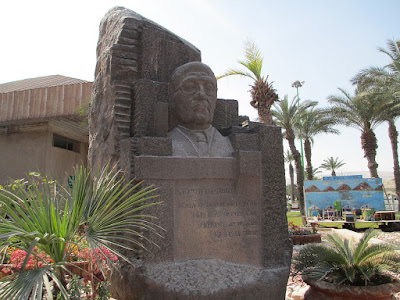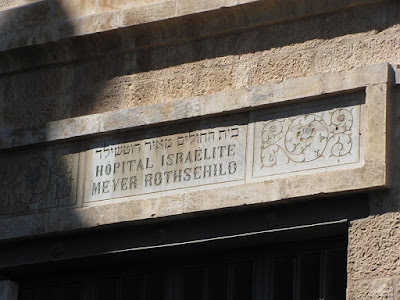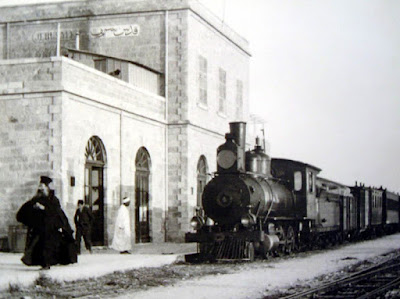Here is the text of what Corbyn said:
I was brought up at school being told, um, that Israel was founded on a piece of empty space, and that they managed to make the desert bloom, and they built things when there was nothing there before. Anybody that studies the history of the region would know, at the end of the Second World War – 1945 to 1948 period – Palestine had media, had industry, had education, had universities, had a relatively high standard of living for the whole region, and was a coherent society and a coherent state. It was a denigration of that which enabled Western opinion to be, um, put together in support of Israel.Corbyn claims that the infrastructure already in place around 1945 to 1948 proves that Jews contributed little to the land.
But why 1945 to 1948?
Apparently, Corbyn assumes that Jews only started immigrating to then-Palestine starting in 1945 -- as refugees from the Holocaust.
The first major wave of Jewish immigration was during Aliyah Aleph from 1882-1903, followed by Aliyah Bet from 1934-1948, which was a reaction to Nazi Germany. Even Aliyah Bet is broken down into 2 stages: 1934 to 1942, which was an effort to help Jews trying to escape Nazi persecution and genocide; 1945-1949 (the dates Corbyn references), which was an effort to find homes for Jewish survivors.
But Jewish contributions to establishing the infrastructure of Palestine date from over a century earlier.
In his book, Jerusalem: A Biography, Simon Sebag Montefiore notes in passing the condition of the land over 100 years before 1948:
There were no carriages, just covered litters. She possessed virtually no hotels or banks; visitors stayed in the the monasteries, the most comfortable being the Armenian with its elegant, airy courtyards. However in 1843, a Russian Jew named Menachem Mendel founded the first hotel, the Kaminitz, which was soon followed by the English Hotel; and in 1848 a Sephardic family, the Valeros, opened the first European bank in a room up some stairs off David Street (emphasis added) p.360.Let's take a look at these and other contributions Jews made to the Palestinian infrastructure, leading to the re-establishment of Israel.
Hotels
The Jerusalem Post has an article on Menachem Mendel Kaminitz's background:
He and his wife arrived in Haifa on the first day of Elul [in 1833] and continued on to Safed, where they joined a community of devout disciples of the Gaon of Vilna. This community was founded in 1810, two centuries ago this year [2010], and 138 years before the creation of the state of Israel.
...While in Europe [collecting funding for the Jewish community in Israel] he published what may have been the first guide book for immigrants and tourists to the Holy Land. Titled Korot Ha’Itim (Happenings of the Times), the book documents the hardships incurred by Jews living in the Holy Land, particularly during the Safed riots and the earthquake [1837]. But it also contains useful advice and many positive remarks about the country despite the hazards and the difficulties that Menachem Mendel endured. The book was published in Vilna in 1839. A Yiddish translation was published in Warsaw in 1841, for those people not sufficiently fluent in Hebrew.
Banks
Jacob Valero also immigrated to Israel, over a century before the re-establishment of Israel:
He was born in 1813 in Istanbul, and his family came to pre-state Israel from Turkey. He later became a moneychanger. In 1848, along with a number of other local businessmen, Valero established the bank in a small two-room apartment in the Old City of Jerusalem, near the Jaffa Gate.
...As the bank's operations expanded, it opened two more branches in Damascus and Jaffa.
...Valero became a local hero because of his connections with the Ottoman rulers in Jerusalem and Istanbul and with the global figures who used the services of his bank. He was a noble figure on the local scene, which blossomed in the final days of the Ottoman Empire and received a number of the honors the disintegrating Ottoman government passed out to local dignitaries in regions distant from its center.
Electricity
On the other hand, there is Pinhas Rutenberg, who immigrated in 1919. Rutenberg founded the Palestine Electric Company, which later became the Israel Electric Corporation. In 1921 the British gave him the electricity concessions for both Jaffa and later, Jordan. The Jaffa Electric Company, establish a grid in 1923 that eventually covered Jaffa, Tel-Aviv, the surrounding area and British military installations in Sarafend [located between Rishon LeZion and Be'er Ya'akov]. He received support from then-colonial secretary Winston Churchill.
 |
| The Palestine Electric Company Ltd in the early 1920s. Public Domain |
Rutenberg also has the distinction of being the first Palestinian citizen under the British Mandate in 1925, when the British enacted a law creating Palestinian citizenship.
Air Travel
In addition, Rutenberg also founded Palestine Airways.
1937 The airline was taken over by Britain's Air Ministry in 1937 until 1940. with the intention of it eventually being transferred back into private hands. It operated from July 1937 until August 1940. Palestine Airways stopped operating then when its aircraft were taken over by the RAF for the war effort.
Potash
While Rutenberg was granted the electricity concession, Moshe Novomeysky - with difficulty - got permission from the British to mine in the Dead Sea area. He immigrated to Israel in 1920 and developed the Palestine Potash Company, which became the Dead Sea Works. Novomeysky made a point of developing good relations with the Arabs in the area. Because of his reputation, kibbutzim he helped established were spared from the anti-Jewish riots of 1936-39.
 |
| Monument commemorating Moshe Novomeysky at Dead Sea Works. Credit: Dr. Avishai Teicher Pikiwiki Israel |
Bakery
Angel's Bakery is not the first bakery in Israel - Salomon Angel bought out Trachtenberg Bakery in Bayit VeGan when it went bankrupt in 1927:
"There was a primitive oven, to which the whole neighborhood would come to leave their pots of hamin [a slow-cooked dish for the Sabbath, know by Ashkenazim as cholent], and then argue about which pot was whose," recalled Vicky Angel, Danny's widow, as she reminisced about the first days of the Angel Bakery.Salomon Angel himself was a seventh-generation Jerusalemite, member of a Sephardi family that traces its lineage back to Jews who were expelled from Spain in 1492.
You can begin to get the idea how, according to historian Howard Sachar:
By 1930, 1,500 Jewish-operated factories and workshops were producing textiles, clothing, metal goods, lumber, chemicals, stone, and cement, with a total capital value of about PL [Palestinian Lira] 1 million.But Jewish contributions did not stop in 1930.
Radio
The Institute for Palestine Studies has an article on Radio Jerusalem which started in 1936, "only two years after the founding of the first official Arab radio station in Cairo (mid-1934) and one year before the death of the renowned Italian physicist Marconi (1937)." It was established by the British Mandate authorities and broadcast in Arab, Hebrew and English. But 4 years earlier, in 1932, the British had given a license to Mendel Abramovitch. His broadcast became known as Radio Tel Aviv and continued until April 1935, when the British revoked his license in order to prepare for the Palestine Broadcasting Service.
Hospitals
According to an article, "Bedouin Health Services in Mandated Palestine", during Ottoman rule from 1516 to 1917, the Palestinian Arabs
relied mainly on traditional medicine including herbal medicine, bone-setting cauterization, blood-letting, leeching, cupping as well as amulet writers, midwives and male religious healers.Into this background, the Rothschild Hospital was founded in 1854 in the Jewish Quarter of the Old City. When there were too many patients for the hospital to handle, a new hospital with more beds was built outside the Old City. The hospital was directed by Dr. Bernhard Neumann, a native of Warsaw who had studied in Cracow and Vienna. He had been in Jerusalem since 1847. It offered free treatment to all patients regardless of religion or nationality, and in 1918 it was taken over by Hadassah and became Israel's first Hadassah Hospital. The Rothschild Hospital was followed by two others in Jerusalem, Bikur Holim and Misgav Ladach. Another Rothschild-funded hospital was later set up in Zichron Yaakov for the farmers and laborers in the area.
 |
| Original Rothschild Hospital nameplate. Credit: Yoninah |
Sachar rounds out the picture:
Hadassah’s dedicated mass membership by 1930 had established in Palestine four hospitals; a nurse’s training school; 50 clinics, laboratories, and pharmacies; and an excellent maternity and child hygiene service in most of the cities and in a number of the larger villages. The Women’s International Zionist Organization (WIZO) maintained three infant welfare centers in Tel Aviv
Railway
An article in Middle East Monitor almost sounds like it could have been a source for Corbyn's statement above about Jewish "denigration" of Arab accomplishments. Entitled Israel is gradually eroding both Palestinian infrastructure and any hope for statehood, it claims:
The Jaffa–Jerusalem railway, which opened in 1892 under Ottoman rule, was the first railway to be built in Palestine and one of the first to be constructed in the Middle East. An important economic and social development at the time, the line was operated in turn by the French, the Ottomans and, after World War I, the British who were mandated to administer Palestine. The railway administration was transferred in 1920 to Palestine Railways, a company owned by the British Mandate government.Actually, while it was opened under Ottoman rule, the truth is that the Turks had little to do with making the railway possible, other than giving permission for others to build it for them. And it was more than merely operated by the French.
The person most responsible for the establishment of the Jaffa-Jerusalem railway was Yosef Navon, a Jewish entrepreneur from Jerusalem. He spent three years in Constantinople to promote the project and in 1888 received a permit from the Ottoman Empire, which included permission to extend the line to Gaza and Nablus. Because he did not have enough capital to move the project forward, Navon went to Europe in 1889 to find a buyer for the concession, and finally found one - in France. A French company, with Navon as a member of its board of directors, built the railway. It started running in 1892 and is considered the first Middle Eastern railway.
 |
| A train arriving at the Jerusalem railway station, on the first railway in the Middle East in the 1890's. Public Domain |
This is not an exhaustive list of Jewish businesses and projects, but it does given an idea of the extent of the Jewish contribution to Palestine during the hundred years or so leading up to the British Mandate and the re-establishment of Israel.
After all, as Sachar writes, in addition to the industrial and economic infrastructure,
It [The Yishuv] had developed its own quasi-government, its own largely autonomous agricultural and industrial economy, and its own public and social welfare institutions.Apparently, one of the problems with Jeremy Corbyn hobnobbing with terrorists is that his statements about Jews and Israel become nothing more than a Corbyn-copy of their narratives and fabrications.
If you found this post interesting or informative, please  it below. Thanks!
it below. Thanks!
 it below. Thanks!
it below. Thanks! 

No comments:
Post a Comment